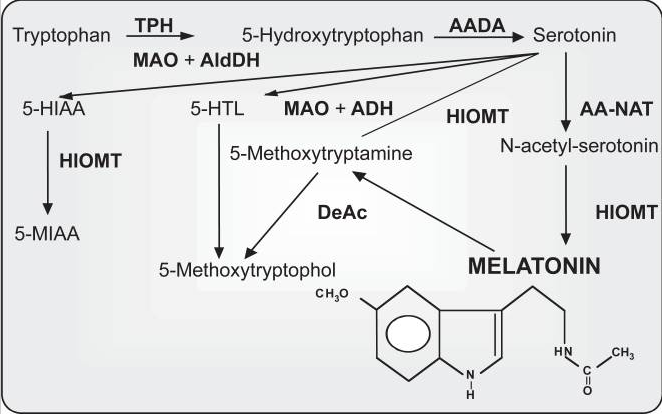Essential amino acid L-tryptophan may reduce the amount of time it takes to fall asleep.

- Improved sleep quality. L-tryptophan has sedative properties that may increase sleepiness and reduce the time it takes to fall asleep.
Overview
L-tryptophan is an essential amino acid used in the synthesis of a wide array of proteins, including enzymes, biochemicals such as vitamin B3, and various neurotransmitters, notably serotonin and melatonin. As an essential nutrient, L-tryptophan must be consumed either from natural food, such as eggs, turkey, nuts, oats, and lentils, or biosynthetic supplements manufactured by fermenting certain bacteria. For most people, average daily intake of L-tryptophan is approximately 0.5 – 2 grams.1
L-tryptophan has been used by physicians for many years to help manage deficiency symptoms, some of which include anxiety, nervousness, insomnia, excessive appetite, and depression.
Serotonin – known to play a role in mood and restful sleep – is the chief byproduct of L-tryptophan supplementation. Farther down the same pathway, L-tryptophan is also converted into melatonin, which is believed to normalize sleep patterns and reduce sleep onset latency.2

How L-Tryptophan Might Help With Sleep
Increasing serotonin and melatonin levels
L-tryptophan affects sleep mainly through its conversion into serotonin, which can then also further be metabolized into melatonin. Both of these brain chemicals play an important role in regulating sleep.4

L-Tryptophan Sleep Benefits & Uses
L-tryptophan supplements are used to aid sleep, and may provide specific benefits such as:5
- reducing sleep onset latency, or the time it takes to fall asleep
- increasing total sleep time
- improving subjective feelings of sleep quality
- improving sleep conditions, including sleep apnea and insomnia
In certain cases, L-tryptophan is also offered as a supplement to enhance mood and relax the body due to its connection to serotonin. It is used, for example, as a way to combat seasonal affective disorder (SAD) and depression, although its effectiveness is still being evaluated.6
Why Choose L-Tryptophan Over 5-HTP?
When the body needs to increase its serotonin levels, be it to facilitate digestion or enhance mood, it activates the conversion of L-tryptophan into 5-hydroxytryptophan (5-HTP), which is then converted into serotonin. The first step of turning L-tryptophan into 5-HTP sort of resembles a switch that tightly controls serotonin production and keeps its numbers within a healthy range.
In contrast, 5-HTP supplements are rapidly turned into serotonin without any control. The sudden surge of the mood-enhancing hormone is ideal for immediately relaxing the body, but poses some risks because it can increase serotonin beyond healthy levels, which can in turn cause side effects.
So, ingesting L-tryptophan allows the body to generate as much serotonin and melatonin as it needs in order to be healthy, while 5-HTP elevates these compounds regardless of the body’s needs.

Research
Human Research
Clinical studies using L-tryptophan have demonstrated its potential usefulness in improving sleep quality on a number of fronts.
In this investigation, 10 patients with sleep disturbances were evaluated for sleep patterns on 3 consecutive nights after taking no treatment the first night, a control solution the second, and 5 grams of L-tryptophan the third. Compared to the other groups, the L-tryptophan group was found to have significantly decreased sleep onset latency, increased sleep period time and total sleep time, and improved subjective feelings of sleep quality based on a self-rating scale.
- The study concluded that “an influence was seen on the quantitative sleep parameters such as sleep period time and total sleep time…[and] an improvement of the subjective feeling measured by a self-rating scale resulted after l-tryptophane.”7
L-tryptophan (3 g) may reduce sleep onset latency
In this double-blind, placebo-controlled investigation, 20 male insomniacs were given either a placebo or 3 grams of L-tryptophan for 6 consecutive nights. L-tryptophan was found to have no noticeable effect on nights 1 through 3 but lowered the amount of time it took to fall asleep on nights 4 through 6. L-tryptophan did not alter brain electrical activity during sleep.
- The study concluded that while “there was no effect of L-tryptophan on sleep latency during the first 3 nights of administration. On nights 4-6 of administration, sleep latency was significantly reduced.”8
L-tryptophan (3 g) may significantly reduce sleep onset latency
In this placebo-controlled, double-blind investigation, 18 women with difficulty falling asleep were given a placebo, 1 gram of L-tryptophan, or 3 grams of L-tryptophan every night throughout the course of a 3-month period. Sleep recordings were taken on 10 distinct evenings. The 3 gram dose was found to significantly reduce sleep onset latency on some of the nights compared to the other doses, but have no measurable impact on REM sleep, slow wave sleep, or wakefulness.
- The study concluded that “3 gms. significantly reduced sleep onset latency on some of the nights.”9
L-tryptophan (1.2 and 2.4 g) may consistently reduce sleep latency and improve sleepiness
In this randomized, placebo-controlled, double-blind investigation, 10 adults were given either a placebo or alternating 1.2 and 2.4 gram doses of L-tryptophan. Compared to the placebo, both doses of L-tryptophan significantly reduced sleep latency, and the 2.4 g dose also improved subjective sleepiness.
- The study concluded that “L-tryptophan consistently reduced sleep latency in normals and that this correlates with blood levels.”10
L-tryptophan (2.5 g) may improve obstructive sleep apnea and increase REM sleep time
In this investigation, 15 adults with sleep apnea were given a 2.5 gram dose of L-tryptophan (L-T) before going to bed. Polysomnograms demonstrated significant improvements in obstructive, but not central, sleep apnea. L-tryptophan also increased REM sleep time and shortened REM latency.
- The study concluded that “an average dose of 2500 mg L-tryptophan (L-T) at bedtime…showed significant improvement in obstructive sleep apnea but not with central sleep apnea.”11
L-tryptophan (2 g) may promote sleepiness
In this double-blind, placebo-controlled investigation, 20 adults were given either a placebo or 2 grams of L-tryptophan early in the morning while having their brain activity recorded. Compared to the placebo, L-tryptophan was found to increase subjective ratings of sleepiness, which coincided with an increase in theta brain wave activity.
- The study concluded that “subjective self-rated sleepiness increased after the ingestion of L-tryptophan.”12

Dosage for Sleep
- Successful research studies have used from 1.2 – 5 g of L-tryptophan daily
- Typical supplemental capsule doses range from 0.3 – 1.5 g per day
Available Forms
- L-tryptophan is not water soluble and so typically comes as a powder or in capsules
- Natural L-tryptophan bound up in protein is easily accessible in protein-containing foods, such as soybeans, cashews, chicken, and turkey.
Supplements in Review Says
- L-tryptophan 500 mg before bed.
L-tryptophan seems to make it easier to fall asleep. We recommend taking L-tryptophan for inducing sleepiness and reducing the time it takes to fall asleep.
Start with 500 mg of L-tryptophan supplements. We recommend starting with a 500 mg dose of L-tryptophan before bedtime, although up to 2 grams may be taken per day.
Does Tryptophan prevent Glycine etc “GABA” aminino acids?